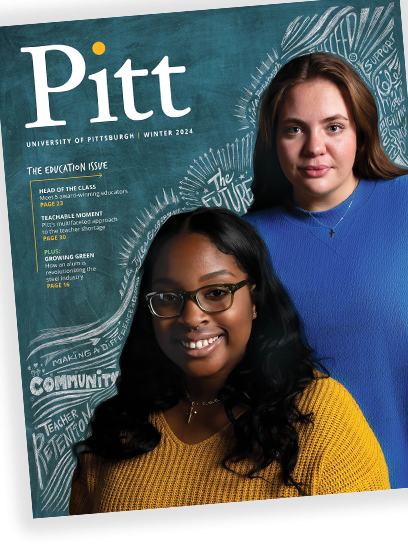
Aleeza Ben Shalom loved to play matchmaker when she was an undergrad at Pitt. “It was just for fun,” she recalls. “I was a go-between with my friends, constantly trying to put people together.”
What started as strong interpersonal skills and a good eye for romantic pairings have evolved for Ben Shalom (A&S ’99) into a thriving career as a Jewish matchmaker. Over the past 15 years, she says, she’s helped more than 200 compatible singles find their forever mates. Last year, she took her skills worldwide when she starred in the Netflix series “Jewish Matchmaking,” which has been viewed by millions.
Pitt Magazine recently spoke to Ben Shalom, who lives in Israel between press tours. (This interview has been edited for clarity and length.)
Beth Kissilef: How did you launch your matchmaking career?
Aleeza Ben Shalom: I started my exploration in 2007, when I worked as a matchmaker with an online matchmaking website. Singles could put their profiles there, but the only way to get set up was to be set up through a matchmaker. That’s how I started my training.
BK: What goes into working as a matchmaker?ABS: Matchmaking has three different components. Number one is what we would call being the introducer. But remember, any match that’s introduced doesn’t automatically work, right? The second part is mentoring, which involves a lot of coaching, a lot of support through the dating process. And the third part is what I call the closer. Once you’re in a good relationship, somebody’s going to close the deal. A lot of people are very uncomfortable with this part of the process, because it’s a life decision. The stakes are very high. So, there’s a lot of stress around this position. But helping with this is one of my favorite things. And I’ve actually designed an entire program around how to gain clarity if this is the person for you.
BK: So, how can someone decide that they’ve found the right person?
ABS: I call it soulmate clarity, and there are a couple different categories to evaluate. Number one is qualities — a combination of personality plus what you each value and want in a relationship. And you want the qualities to be aligned to a high degree. There’s another category: fears. These are generic relationship fears and you need to think about whether the person you’re dating triggers those fears to a low, medium or high degree. The third category is what I like to call bothers. Those are the things that irritate you about this other person. We have to decide: “Is this something that I can manage in my relationship or not?” By combining the qualities, the fears and the bothers, you can come up with an overall picture of compatibility.
BK: What did you learn at Pitt that helps you now?
ABS: My classes in anthropology and my interdisciplinary studies major, where I studied Judaism, children’s literature and public policy. I was also social chair and president of Hillel, where I learned about interpersonal relationships and leadership and worked very hard to build a beautiful relationship with the community. Pittsburgh has a strong Jewish community, so that was a huge plus. I met students, professors and community leaders who helped build an infrastructure for my personal growth.
BK: Do you feel like a celebrity now that you’re a Netflix star?
ABS: I do! I’m recognized. I feel like a celebrity in Israel. The people I’ve met are so happy and proud of the show’s representation of Jews, of Orthodox Jewish women, of Israel, of Israelis, of Judaism. People have been on fire about this.
BK: As a Jewish woman, is there anything you hope the show’s viewers learn about your community?
ABS: I hope that the show helps people become curious about Judaism. The most unique thing about our show is that it shows all different types of Jews from different locations, with different levels of Jewish observances. Usually, in media you will see people hyper focus on one part of the Jewish community. But with this show, everybody came together, and everybody respected one another — and we learned so much.



